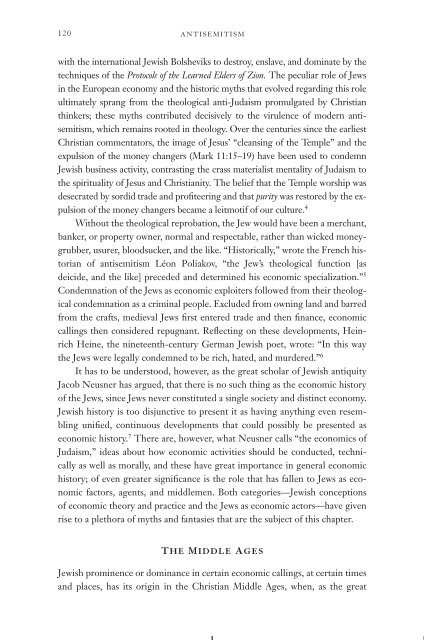41845358-Antisemitism
41845358-Antisemitism
41845358-Antisemitism
Create successful ePaper yourself
Turn your PDF publications into a flip-book with our unique Google optimized e-Paper software.
120 ANTISEMITISM<br />
with the international Jewish Bolsheviks to destroy, enslave, and dominate by the<br />
techniques of the Protocols of the Learned Elders of Zion. The peculiar role of Jews<br />
in the European economy and the historic myths that evolved regarding this role<br />
ultimately sprang from the theological anti-Judaism promulgated by Christian<br />
thinkers; these myths contributed decisively to the virulence of modern antisemitism,<br />
which remains rooted in theology. Over the centuries since the earliest<br />
Christian commentators, the image of Jesus’ “cleansing of the Temple” and the<br />
expulsion of the money changers (Mark 11:15–19) have been used to condemn<br />
Jewish business activity, contrasting the crass materialist mentality of Judaism to<br />
the spirituality of Jesus and Christianity. The belief that the Temple worship was<br />
desecrated by sordid trade and profiteering and that purity was restored by the expulsion<br />
of the money changers became a leitmotif of our culture. 4<br />
Without the theological reprobation, the Jew would have been a merchant,<br />
banker, or property owner, normal and respectable, rather than wicked moneygrubber,<br />
usurer, bloodsucker, and the like. “Historically,” wrote the French historian<br />
of antisemitism Léon Poliakov, “the Jew’s theological function [as<br />
deicide, and the like] preceded and determined his economic specialization.” 5<br />
Condemnation of the Jews as economic exploiters followed from their theological<br />
condemnation as a criminal people. Excluded from owning land and barred<br />
from the crafts, medieval Jews first entered trade and then finance, economic<br />
callings then considered repugnant. Reflecting on these developments, Heinrich<br />
Heine, the nineteenth-century German Jewish poet, wrote: “In this way<br />
the Jews were legally condemned to be rich, hated, and murdered.” 6<br />
It has to be understood, however, as the great scholar of Jewish antiquity<br />
Jacob Neusner has argued, that there is no such thing as the economic history<br />
of the Jews, since Jews never constituted a single society and distinct economy.<br />
Jewish history is too disjunctive to present it as having anything even resembling<br />
unified, continuous developments that could possibly be presented as<br />
economic history. 7 There are, however, what Neusner calls “the economics of<br />
Judaism,” ideas about how economic activities should be conducted, technically<br />
as well as morally, and these have great importance in general economic<br />
history; of even greater significance is the role that has fallen to Jews as economic<br />
factors, agents, and middlemen. Both categories—Jewish conceptions<br />
of economic theory and practice and the Jews as economic actors—have given<br />
rise to a plethora of myths and fantasies that are the subject of this chapter.<br />
THE MIDDLE AGES<br />
Jewish prominence or dominance in certain economic callings, at certain times<br />
and places, has its origin in the Christian Middle Ages, when, as the great


